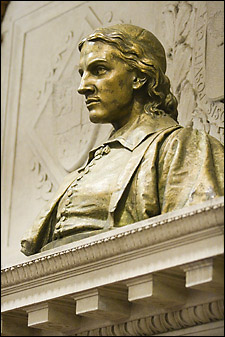Preliminary suggestions on general education offered
Harvard College students of the future will be engaging more with science, citizenship, culture, and religion if the new curriculum offered by the Task Force on General Education is ultimately adopted by the Faculty of Arts and Sciences (FAS).

The preliminary proposal, released by the task force Oct. 3 for discussion by the FAS, is intended as a series of suggestions for how most effectively to replace the college’s present “core curriculum.”
The task force, which was co-chaired by Louis Menand, professor of English and Alison Simmons, professor of philosophy, was appointed in June and held meetings over the summer. During the meetings the members of the small group considered previous proposals for General Education developed as part of the College’s comprehensive curricular review and drafted a revised approach for further discussion. In addition to Menand and Simmons, the task force included psychologist Stephen M. Kosslyn, chemist David R. Liu, paleontologist David R. Pilbeam, sociologist Mary C. Waters, and two undergraduates, Ryan Petersen ’08 and Limor Spector ’07. Assistant Dean of the College Stephanie H. Kenen served as an ex officio member.
The report’s proposal does not aim to prescribe specific courses required of all students. Rather, the proposed new curriculum calls for students to take seven half courses in five broad areas “of inquiry and experience”: Cultural Traditions and Cultural Change, the Ethical Life, the United States and the World, Reason and Faith, and Science and Technology. It also calls for three half courses to develop critical skills in written and oral communication, foreign language, and analytical reasoning.
“It has become effectively impossible,” the task force wrote in its letter introducing their proposal, “to reach agreement on a single canon of knowledge (leaving aside whether it is desirable to do so).”
According to Simmons, “The important part is that we’ve found a rationale for general education: to connect liberal arts education with life,” she said. “There was a feeling that the liberal arts need to be defended, and Harvard has to take a stand, on how liberal education changes students and help them be better people. Once we had that settled, the other things fell into place.”
The general education curriculum is a rounding-out academic middle layer between a student’s area of concentration and the outer layer of electives.
The “reason and faith” requirement is the one that has generated the most initial press reaction. “Harvard is no longer an institution with a religious mission, but religion is a fact that Harvard’s graduates will confront in their lives both in and after college,” the task force report said, noting that 94 percent of incoming students report that they discuss religion “frequently” or “occasionally” and that 71 percent say they attend religious services.
The task force noted, “Reason and Faith is a category unlike any that Harvard has included in its general education curriculum,” but also stressed: “Let us be clear. Courses in Reason and Faith are not religious apologetics. They are courses that examine the interplay between religion and various aspects of national and/or international culture and society.”
The citizenship role, specifically American citizenship, drew the attention of the task force as well. Students “need to have an understanding of American history, American institutions, and American values,” the report states; “they also need to appreciate the place of those institutions and values in a shifting global context.”
The sciences were another area of focus by the task force. “Too many students in liberal arts colleges graduate having only a passing acquaintance with the science and technology that will shape their lives, both personal and as members of a public,” the report found. “Students need to leave Harvard with skills to match the world’s speed.”
The proposed new curriculum reflects an awareness that only a single-digit share of incoming freshmen aspire to careers in academia, while a solid majority (53 percent) of seniors plan to attend business, law, or medical school on graduation. The new program is emphatically not meant to be “pre-professional,” but the report does note, “Harvard College is part of a large research university that includes many of the country’s best professional schools. … General education courses can therefore usefully draw on the faculty of the professional schools.”
The proposed general education curriculum is to replace the core curriculum, which was a fruit of the academic upheavals of the late 1960s and early ’70s, and intended to stress that there are many ways of learning and knowing. But the original rationale for the Core “is no longer compelling,” the current task force has found, in part because the disciplines have shifted and become more integrated, and in part because some of the core courses covered “relatively narrow bands of subject matter.”
Menand, co-chair of the task force observed that his group, which included only six professors, was building on the work of other recent curricular review efforts. “We are a small committee that met over the summer. This report is a bone with some meat on it. We hope it gives people something to chew on.”
The task force has begun meetings with groups of other professors and students. The report will be presented to the faculty Nov. 14.




